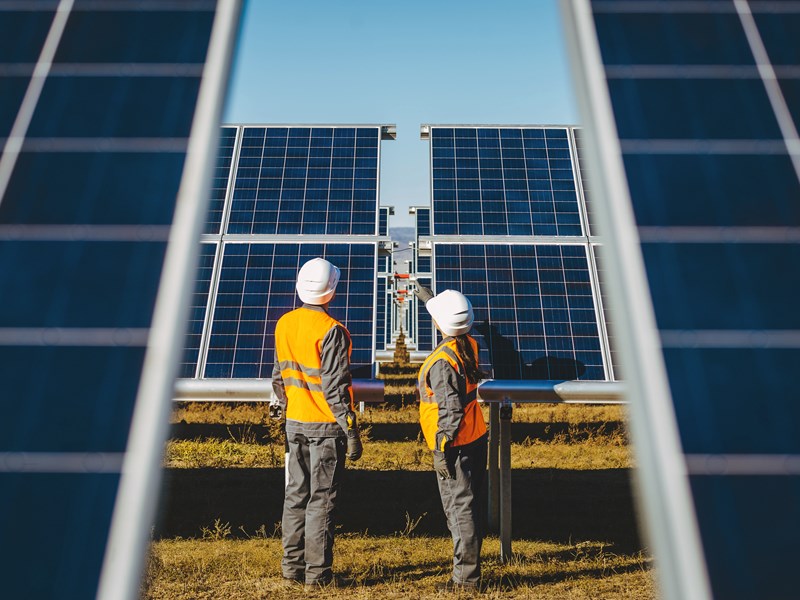- Home /
- News /
- Infrastructure
Legislative Council passes renewable energy targets
14 March 2024

The Legislative Council has debated and passed a new bill to set renewable energy targets for Victoria.
The Council agreed to an amendment moved by Dr Sarah Mansfield to the Climate Change and Energy Legislation Amendment (Renewable Energy and Storage Targets) Bill 2023 and the bill will now return to the Legislative Assembly to consider this amendment.
In her second reading speech in the Legislative Assembly, Minister for Climate Action, Minister for Energy and Resources, Lily D'Ambrosio said the bill would ‘set renewable energy targets, introduce crucial energy storage targets and Australia’s first offshore wind electricity generation targets, and expressly embed climate consideration in land use planning decision-making'.
“ We lost power to somewhere around 400,000 homes. But what happened was the gas peaking plants all kicked in and were firing on all cylinders to provide vital energy to our homes and businesses and vital services. ”
Melina Bath, Member for Eastern Victoria
The bill will set a new Victorian Renewable Energy Target of 95 per cent renewable electricity generation by 2035. It will also legislate interim emissions reduction targets: 28-33 per cent below 2005 levels by 2025; 45–50 per cent below 2005 levels by 2030; and 75-80 per cent below 2005 levels by 2035.
The Planning and Environment Act will be amended to require consideration of climate change when making planning decisions about the use and development of land under the act and for other purposes, which includes greenhouse gas emissions, reductions targets and increased climate resilience.
“ No-one has decarbonised a major, developed economy’s electricity grid without using a combination of large-scale hydro-electric and/or nuclear energy. No-one has done it with renewable energy alone. ”
David Limbrick, Member for South-Eastern Metropolitan
Member for Eastern Victoria Melina Bath said, while not opposing the bill, the Nationals and Liberals supported a role for gas in the energy mix.
'When the transmission lines fell over the other day, what happened? We lost power to somewhere around 400,000 homes. But what happened was the gas peaking plants all kicked in and were firing on all cylinders to provide vital energy to our homes and businesses and vital services, so we saw that there was a place for those gas peaking plants,’ she said.
Member for South-Eastern Metropolitan David Limbrick, said the Libertarian Party would be opposing the legislation.
“ The fact that this state is 42.7 per cent below our peak in emissions is commendable, and 40 per cent of our electricity is coming from renewables. ”
Tom McIntosh, Member for Eastern Victoria
‘If we look around the world, no-one has decarbonised a major, developed economy’s electricity grid without using a combination of large-scale hydro-electric and/or nuclear energy. No-one has done it with renewable energy alone. It remains to be seen, in this experiment that we are conducting, under pressure from international forces and many within our own country, whether we are successful with that or not,’ he said.
Member for Eastern Victoria Tom McIntosh said Victoria should be commended for its progress on reducing emissions.
‘The fact that this state is 42.7 per cent below our peak in emissions is commendable, and 40 per cent of our electricity is coming from renewables,’ he said.
“ Six years gives us plenty of time to gradually close down our remaining ageing coal-powered plants and deliver a renewables blitz that our incredible landmass and interstate transmission infrastructure would enable. ”
Sarah Mansfield, Member for Western Victoria
Southern Metropolitan MP David Davis said setbacks to the offshore wind industry meant it was unclear how the targets would be achieved.
‘So we are putting in place a target today – sounds a good idea, but there is no feasible way of achieving it. There is no assembly plant that is in contemplation, there are no assembly plant or planning arrangements in place to actually assemble and build the offshore wind capacity that is needed to achieve the targets,’ he said.
Western Victoria MP Sarah Mansfield said the Greens supported the objectives of the bill but said the targets fall short of what is needed to prevent climate change.
'Emerging research has shown that Victoria can achieve coal-free electric power generation and possibly 100 per cent renewable power by 2028. Six years gives us plenty of time to gradually close down our remaining ageing coal-powered plants and deliver a renewables blitz that our incredible landmass and interstate transmission infrastructure would enable. But if that fails, we propose that Victoria at least match the ambition of the federal government and legislate an 82 per cent target by 2030,’ she said.
Youc can read the entire debate in Hansard.